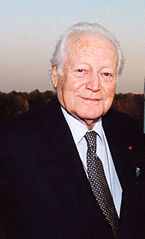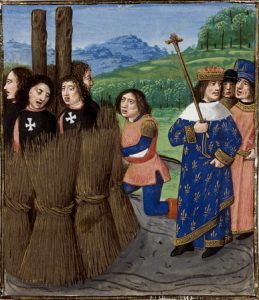Epic medieval saga? Check. Long delay between books? Check. Lavish TV adaptation? Check. The Accursed Kings was everything I wanted for a post-Game of Thrones / pre-Winds of Winter fix
When a new English translation of The Accursed Kings series of historical novels was issued in 2013, George R. R. Martin contributed the foreword. He called it “the original game of thrones.” It’s easy to see the connection. Political machinations. Sexy intrigue with murderous results. Feudal families clashing, their bonds tested and frayed.
While the events of The Accursed Kings, taking place in France over the first half of the 14th century, are in the history books, it’s author Maurice Druon’s particular telling that makes it so influential.
But the big question is, does it fill the Game of Thrones shaped void in your heart?
Game of Thrones Minus the Dragons and Zombies

I realize I may have turned off potential readers with the above tagline. But really, it’s meant as a compliment. I’m probably in the minority, but I’ve never much warmed to many of A Song of Ice and Fire‘s most fantastical elements. (I completely glaze over when I get to Bran’s chapters ?) It’s what the books have to say about the human condition that keep me reading. If you’re hooked on the intrigue and struggles of Tywin Lannister, Littlefinger, Cersei and others, you have to check out this series.
I happened upon Druon’s medieval epic when I was actively searching for reading material after Game of Thrones ended (I’ll save my own thoughts on that final season for… never.) It hooked me from the beginning. I devoured each of the seven books (with one huge exception, which I’ll get to in a later post) as quickly as I could. The books in turn led me to the big-budget 2005 French mini-series adaptation, which was stunning and memorable in its own right.
OK, I’m Interested, So What’s It About?

The Accursed Kings takes place in France and England during the first half of the 14th century. King Philip IV of France persecutes the Knights Templar, fabricating lurid charges of heresy in order to get his hands on the knights’ gold. This sets off a chain of events that sees France slide from great medieval kingdom into bitter political infighting, economic decline and the disastrous Hundred Years’ War.
The story is mostly told from the point of view of the main participants in France’s power struggle: various members of different branches of the ruling Capetian dynasty. We see their machinations succeed and fail as momentum swings in one direction, then another in the multi-sided conflict. None of the plotters is ever quite as clever as they think they are, leading to unexpected twists in fortune.
Druon also uses an omniscient narrator, often telling us the eventual fate of minor characters or how tangential events will play out far into the future. The novels are sprinkled with footnotes revealing fascinating tidbits about medieval life. Despite a general adherence to historical events, the author isn’t above taking dramatic license. He definitely follows the adage, “when the legend becomes fact, print the legend.”
What About Behind the Scenes, er, Pages?
A popular series when they first came out in the late 50’s in France, The Accursed Kings gained new audiences with not one, but two miniseries adaptations (in 1972 and 2005). The first six novels were published between 1955 and 1960. A concluding novel came out (avert your eyes, ASOIAF fans) seventeen years later!
Despite their success, Druon reportedly didn’t care for them, remarking that he only wrote them for the money. (Writing fiction to earn money? What? You can do that?)
The novels really entered the consciousness of the English-speaking world when translations were re-released in 2013, complete with George R. R. Martin’s hat tip.
While there are superficial similarities to A Song of Ice and Fire (minus, you know, the dragons and stuff), The Accursed Kings is much more overtly political. The son of Russian Jewish emigrés, Druon fought for the Resistance and the Free French during World War II. Notoriously conservative (he tried to ban women from the Academie Française), his novels are somewhat contradictory. He expresses approval of medieval administrators who, relative to their times, were downright progressive. Misogyny abounds in the books’ depiction of women, yet the female characters are also memorably multi-dimensional, smart and independent, yet flawed.
Perhaps due to his wartime experiences, the narration doesn’t hide its disdain for populist strongmen. He is also scathing of mediocre men who, due to the accident of birth, are given far more power than they deserve. These harsh judgments on the nobility of medieval France might be behind their friendly reception behind the Iron Curtain. The Communist authorities allowed them to be translated and distributed in the Soviet Union. Among early fans was a young Vladimir Putin, who may have used the novels’ various scheming strongmen as role models. Now there’s a recommendation!